LATEST INSIGHTS
Your Present Location: LATEST INSIGHTS-
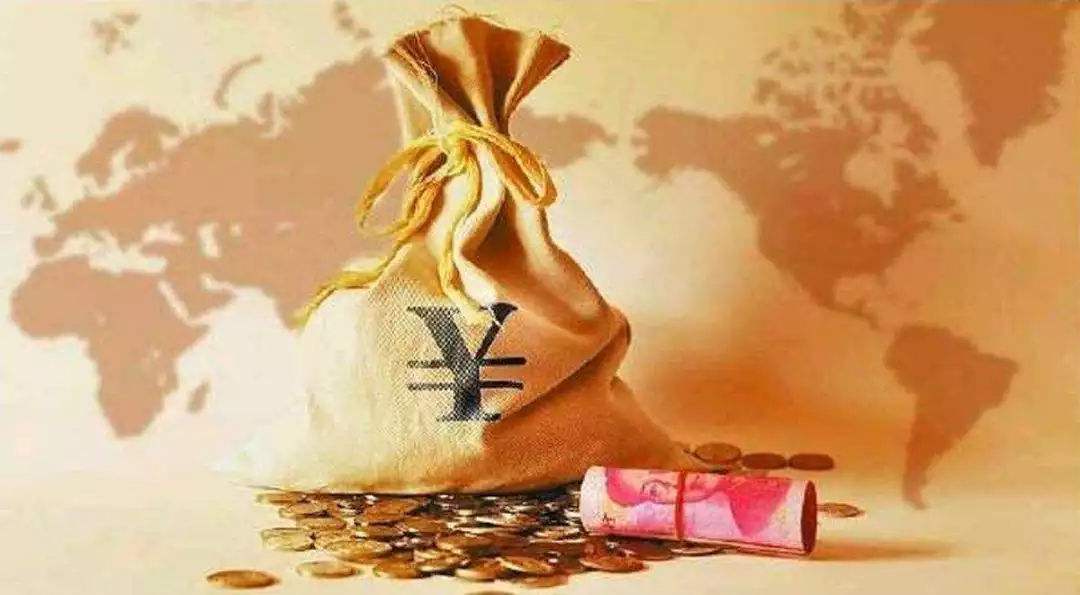
Over 70 foreign central banks or monetary authorities have included RMB in their foreign reserves
2020-08-31 -
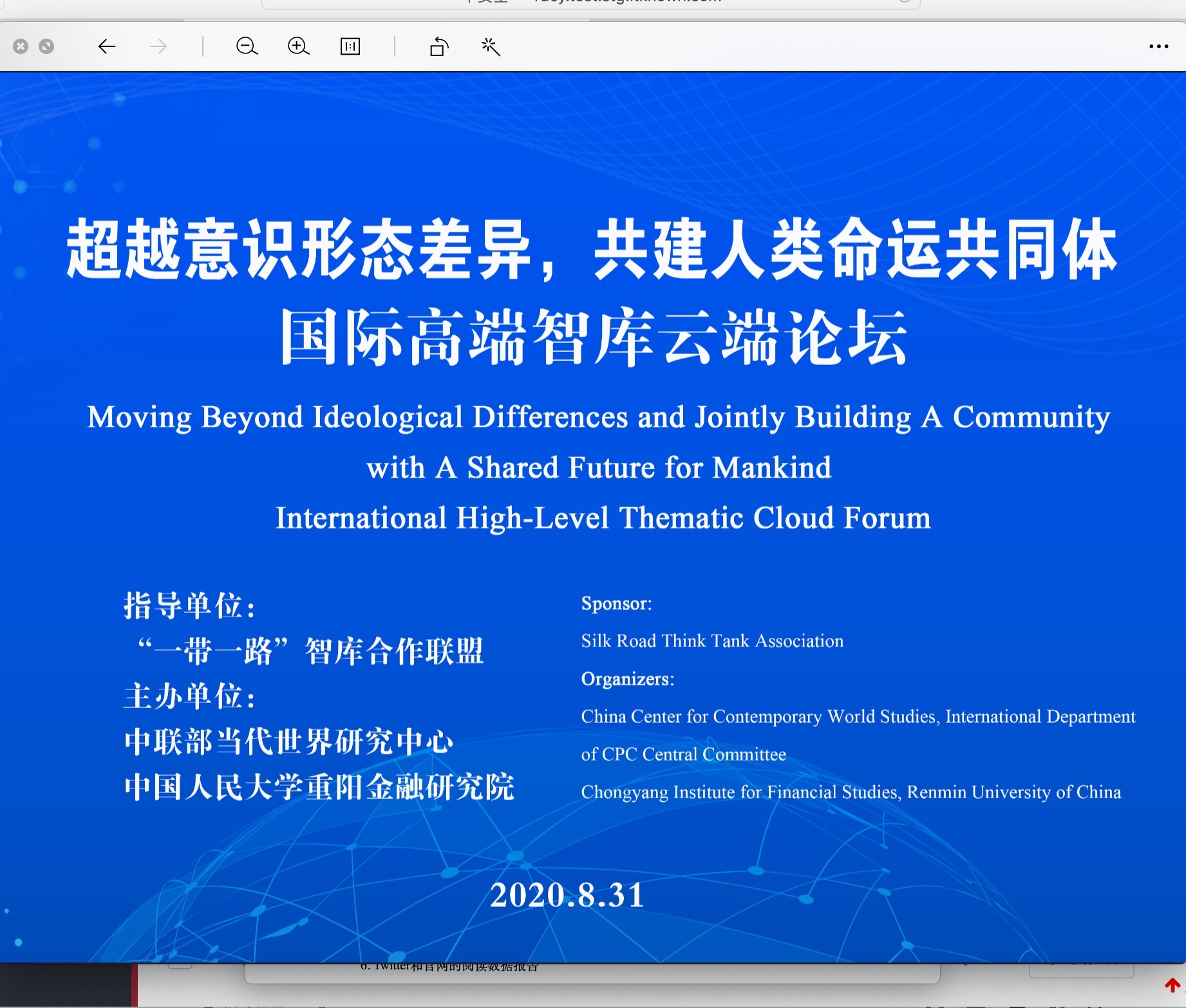
Moving Beyond Ideological Differences and Jointly Building A Community with A Shared Future for Mankind International High-Level Thematic Cloud Forum
August 31, 2020 15:00-19:00 (Chinese Standard Time)
Sponsor: Silk Road Think Tank Association
Silk Road Think Tank Association
Organizers:
China Center for Contemporary World Studies, International Department of CPC Central Committee
Chongyang Institute for Financial Studies, Renmin University of China2020-08-31 -
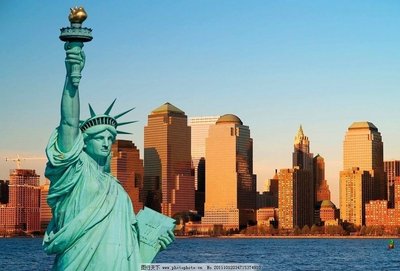
Jin Canrong: why is the United States the most powerful? Because its values are very fragile
Recently, the U.S. government has frequently “stepped in” against China, and its efforts to suppress and stimulate China have become stronger and stronger. But at the same time, its internal problems are also emerging. On the current situation of the United States, observer net interviewed Jin Canrong, Professor of the school of international relations of Renmin University of China, and asked him to talk about his views on how to view the United States and how to deal with the future Sino US relations. The following is the content of the interview.
2020-08-28 -
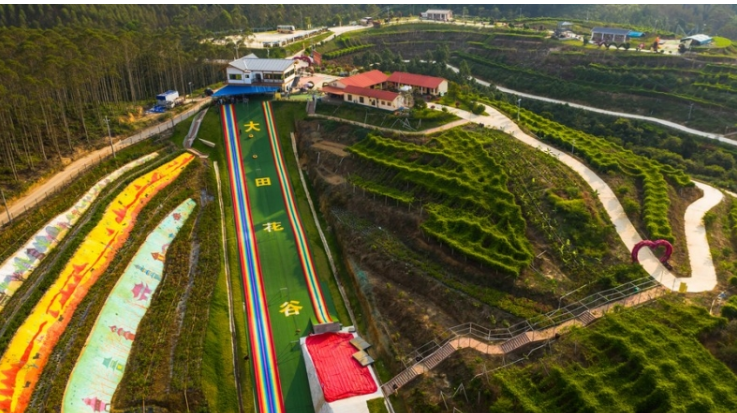
John Ross:The Decisive Role of Poverty Reduction in China's 2020 Targets
The statement that China’s economic achievement is the greatest in human history in terms, not only of improvement of the conditions in China but of improvement of the overall condition of humanity, is therefore not one made by an “overheated” Chinese nationalist.
2020-08-27 -

From fixed to floating housing loan interest rates, buyers should choose rationally
Different people have different opinions on interest rate trends, and their calculation methods have their own advantages.What impact does the "change of anchor" mortgage interest rates have on us? Make up the down payment, borrow money to buy a house, and mortgage interest rates are topics of great concern to home buyers. Recently, the Industrial and Commercial Bank of China, China Cons...
2020-08-27 -
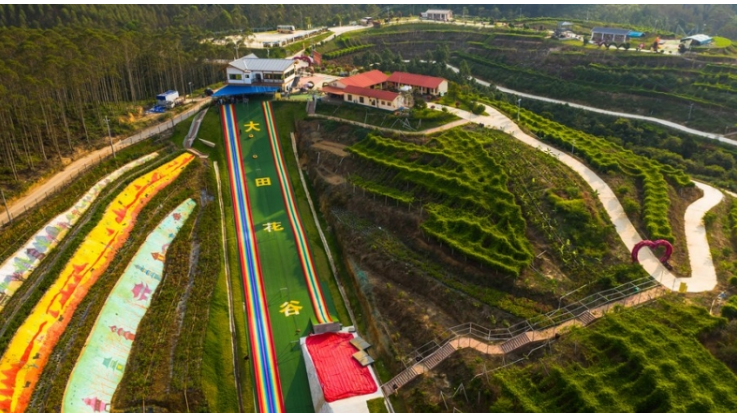
John Ross: The Decisive Role of Poverty Reduction in China's 2020 Targets
2020-08-27 -
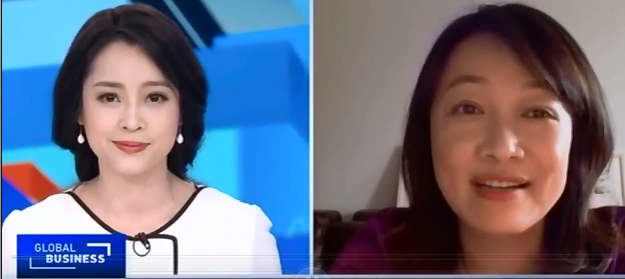
CGTN: Chinese Valentine's Day hints at real comeback of retail sector
Tuesday marks Chinese Valentine's Day, also known as the Qixi Festival. For many businesses in China, it's totally different compared to Valentine's Day on February 14, when the country was grappling with the COVID-19 outbreak.
2020-08-27 -
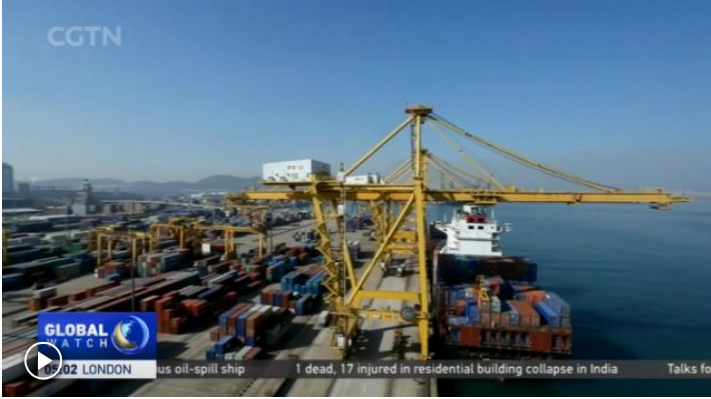
China-US Trade Talks: Review of Phase 1 deal
It's been more than six months since China and the U.S. signed that trade agreement. Our reporter Wang Hui reviews what the phase one deal includes.After nearly two-year long trade dispute, China and the U.S. finally inked their phase-one agreement in January this year, which took effect on February 14th.
2020-08-26 -

China, ASEAN to enhance tech ties under BRI framework
Under the Belt and Road Initiative (BRI) framework, the cooperation between China and the Association of Southeast Asian Nations (ASEAN) has made great progress in infrastructure and trade. Though COVID-19 severely impacted traditional industries this year, China and the ASEAN are seeing new opportunities to accelerate cooperation on technology.
2020-08-26 -
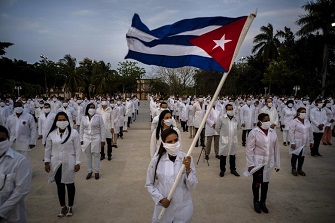
Vijay Prashad: Why Cuban Doctors Deserve the Nobel Peace Prize
Five years ago, I read the story of Dr. Félix Báez, a Cuban doctor who had worked in West Africa to stop the spread of Ebola. Dr. Báez was one of 165 Cuban doctors of the Henry Reeve International Medical Brigade who went to Sierra Leone to fight a terrible outbreak in 2014 of a disease first detected in 1976. During his time there, Dr. Báez contracted Ebola.
2020-08-25 -

Wang Wen: Multipolar history is a lesson for rising China
Among fellows of all think tanks, I admire British historian Arnold Joseph Toynbee (1889-1975) the most. He is best known for his 12-volume A Study of History, which contains more than 3 million words and about 7,000 pages. These tomes trace the development and decay of 19 world civilizations in the historical record, most of which can be described as the most profound illustrations of human civilization.
2020-08-25 -
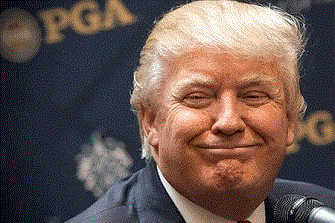
Conway's departure deepens negative image of Trump administration, shows a society divided by politics
Few days after Steve Bannon, former advisor of US President Donald Trump, was arrested and charged with fraud, another long-standing advisor Kellyanne Conway announced on Sunday to leave the White House, which observers believe may deepen the negative image of Trump administration and update people's impression to the world largest power.
2020-08-25 -

Wang Yiwei: China, ASEAN to enhance tech ties under BRI framework
Under the Belt and Road Initiative (BRI) framework, the cooperation between China and the Association of Southeast Asian Nations (ASEAN) has made great progress in infrastructure and trade. Though COVID-19 severely impacted traditional industries this year, China and the ASEAN are seeing new opportunities to accelerate cooperation on technology.
2020-08-25 -
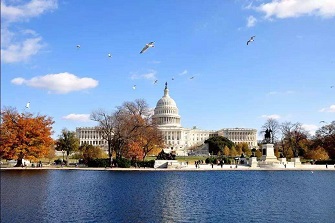
Liu Zhiqin: Politicians who only”fight” but not”reasonable” are taking the United States into a new”mud.”
Looking at the various words and deeds of this administration of the United States, many people have begun to suspect that a few politicians in the United States seem to behave abnormally, with uncertainties that ordinary people cannot predict. It may be more appropriate for us to diagnose important members of the US government as”political autism.” Two years ago, we just thought they were “suspected”, but after two years of observation and analysis by the international community, it can be confirmed that these American political elites are indeed suffering”Political Autism”.
2020-08-25 -
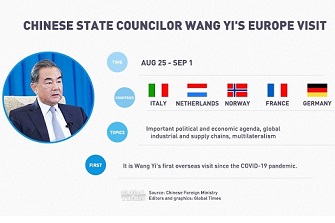
Wang Yi's Europe visit to call for multilateralism, strengthen cooperation amid US' unilateralism
Chinese State Councilor Wang Yi's upcoming Europe visit will help consolidate China-Europe relations, explore practical cooperation in responding to the pandemic and call for multilateralism amid US unilateralism and attempts to form an anti-China alliance in Europe, analysts said. Wang, who is also the Foreign Minister, will visit Italy, the Netherlands, Norway, France and Germany in his first overseas visit since the COVID-19 pandemic. The week-long visit has been welcomed by the relevant countries and demonstrates that both sides attach great importance to China-Europe relations, said Zhao Lijian, spokesperson of the Chinese Foreign Ministry, on Monday.
2020-08-25 -
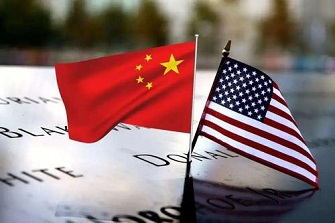
Positive signal for trade talks with US
China has approved plans by US-based asset manager BlackRock Inc, together with Singapore's Temasek Holdings and China Construction Bank Corp (CCB), to establish an asset management joint venture in China, a move industry observers said sends a positive signal ahead of a much-anticipated call between China and the US over the phase one trade agreement in the coming days.
2020-08-24 -

Djoomart Otorbaev: A road trip in Gansu shows effectiveness of campaign to end poverty
At the end of July 2019, I visited the Gannan Tibetan autonomous prefecture in Gansu province that has a population of about 700,000. We drove 230 kilometers from Lanzhou, capital of Gansu, to Hezuo, the prefecture seat area of Gannan, on a first-class highway through picturesque landscape, and passed through many excellently designed and built tunnels several kilometers long. The cost of building those tunnels alone could easily be in billions of dollars. And to think that China has spent such a huge amount just to make the lives of less than 1 million people better.
2020-08-24 -
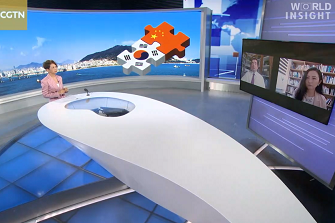
【CGTN】Experts analyze top Chinese diplomat's visit to South Korea
China's top diplomat Yang Jiechi visits the South Korea city of Busan. Yang will meet South Korean National Security Advisor Suh Hoon. The meeting has major geopolitical as well as post-pandemic implications. CGTN Host Tian Wei speaks to scholars from China and South Korea to shed light on this groundbreaking meeting.
2020-08-24 -
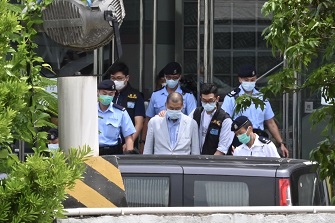
Regulators investigating Next Digital's abnormal trading prices
Hong Kong market regulators have questioned some securities firms and requested customer information and transaction records regarding the "abnormal stock prices and trading volume" of Jimmy Lai Chee-ying's media firm Next Digital, local media on.cc reported Thursday. Shares of Next Digital plunged by 41.54 percent Thursday to close at HK$0.38 ($0.049). Chinese analysts said the roller-coaster performance of Next Digital shares over the past few days showed signs of international capital making a splash at a time of Lai's arrest and bail.
2020-08-21 -
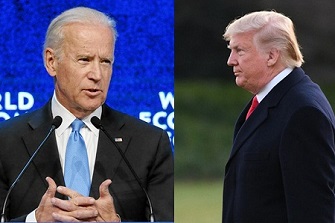
Biden 'smoother' to deal with
Although most observers, polls and surveys made by US media outlets and institutes, as well as Chinese experts predicted that Joe Biden could defeat Donald Trump to become the next US president in the November presidential election, but if Trump is reelected, it won't become another Black Swan incident like his victory in 2016. Biden was officially nominated as the Democratic Party's presidential candidate at the party's convention Tuesday. The Democrats' national convention showed unity as all senior members and several former Democratic presidents endorsed Biden.
2020-08-20
























































































 京公网安备 11010802037854号
京公网安备 11010802037854号





